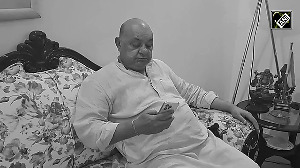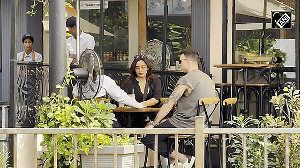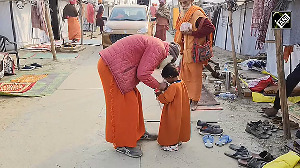Osama bin Laden's killing brought to an end the most intense manhunt in history and as the four helicopters swooped down on the isolated villa, bin Laden's Arab bodyguards opened fire from the roof of the house. An intense round of heavy gunfire rocked Abbottabad as the fighting raged in the town, which is home to three Pakistani army regiment and is dotted with military buildings.
US officials, who did not want to be named, said the discovery that bin Laden was holed up in an army town in Pakistan raised pointed questions about how he managed to evade capture and whether Pakistan's military intelligence knew about his whereabouts and sheltered him. Most intelligence estimates figured that bin Laden was holed up in Pakistan's tribal areas, close to the Afghan border, possibly in a cave sheltered by loyal tribesmen.
US officials said it was not immediately known how long bin Laden had been in Abbottabad, which is just an-hour-and-half drive from Islamabad. A Pakistani official claimed the helicopters took off from the Ghazi Air Base in northwest Pakistan where the US army was based to help out in the aftermath of the floods in 2010.
ABC quoted Pakistani officials as saying that a son of bin Laden and three others were killed in the raid. There was no US casualty. The reports said that a number of heavily armed men, apparently bin Laden's bodyguards, were taken away from the scene by the US forces.
The house were bin Laden was holed is just 100 yards from the gate of the Kakul Military Academy, an army run institution where top officers train. Giving a graphic account of the operation, ABC quoting officials said some 10 years after the abortive US bid to nab him in the caves of Tora Bora, a small group of American forces in helicopters took just 40 minutes to land in a well-guarded mansion in a secure neighbourhood.
Disgorging from choppers, the commandos shot the Al Qaeda leader in his head after some fire exchange, officials said. Noting that the operation itself was a culmination of years of careful and highly advanced intelligence work, a senior administration official said officers from the Central Intelligence Agency, National Security Council and other intelligence wings of the government world very hard to get every possible information about the most wanted fugitive of the world.
"When a case had been made that this was a critical target, we began to prepare this mission in conjecture with the US military," the official said, adding that in the end it was the matchless skill and courage of these Americans that achieved the goal.
American intelligence experts, who worked on this issue for years, believed that there is a string possibility that the terrorist who is hiding there is bin Laden. Walking through the key points in this intelligence trail, a senior administration official said that from the time they first recognised bin Laden as a threat, CIA gathered leads on individuals in his inner circle including his personal couriers.
The information was also collected from detainees. One courier in particular had their constant attention. Detainees gave the Americans his nom de guerre or his nickname and identified him as Khalid Sheikh Mohammed, the mastermind of 9/11, and a trusted assistant of Abu Faraj al-Libbi, the former number three of the Al Qaeda who was captured in 2005.
Detainees also identified this man as one of the few Al Qaeda couriers trusted by bin Laden. They indicated he might be living with and protecting him. "But for years, we were unable to identify his true name or his location" say intelligence experts.
Four years ago, the Americans were successful in uncovering his identity. About two years ago, after months of persistent effort, the US intelligence identified areas in Pakistan where the courier and his brother operated. Still they were unable to pinpoint exactly where they lived, due to extensive operational security on their part.
"The fact that they were being so careful reinforced our belief that we were on the right track," a senior administration official said. It was in August 2010, the US intelligence found their residence, a compound in Abbottabad in Pakistan. "The area is relatively affluent, with lots of retired military. It's also insulated from the natural disasters and terrorist attacks that have afflicted other parts of Pakistan," the official said.
When they saw the compound where the brothers lived, the Americans were shocked by what they saw -- an extraordinarily unique compound. The compound sits on a large plot of land in an area that was relatively secluded when it was built. It is roughly eight times larger than the other homes in the area. When the compound was built in 2005, it was on the outskirts of the town center, at the end of a narrow dirt road.
In the last six years, some residential homes have been built nearby. The physical security measures of the compound are extraordinary. It has 12 to 18-foot walls topped with barbed wire. Internal wall sectioned off different portions of the compound to provide extra privacy.
Access to the compound is restricted by two security gates, and the residents of the compound burn their trash, unlike their neighbors, who put the trash out for collection. The main structure, a three-story building, has few windows facing the outside of the compound. A terrace on the third floor has a seven-foot privacy wall. It's also noteworthy that the property is valued at approximately $ 1 million but has no telephone or Internet service connected to it.
The brothers had no explainable source of wealth, officials said, adding that as a result, intelligence analysts concluded that this compound was custom built to hide someone of significance. American intelligence soon learned that more people were living at the compound than the two brothers and their families. A third family lived there -- one whose size and whose makeup matched the bin Laden family members that US intelligence believed most likely to be with Osama.
"Our best assessment, based on a large body of reporting from multiple sources, was that bin Laden was living there with several family members, including his youngest wife," the official said.
"Everything we saw -- the extremely elaborate operational security, the brothers' background and their behaviour, and the location and the design of the compound itself was perfectly consistent with what our experts expected bin Laden's hideout to look like. Keep in mind that two of bin Laden's gatekeepers, Khalid Sheikh Mohammed and Abu Faraj al-Libbi, were arrested in the settled areas of Pakistan," the official said.
American analysts looked at this from every angle, considering carefully who other than bin Laden could be at the compound. They conducted red team exercises and other forms of alternative analysis to check their work. No other candidate fit the bill as well as bin Laden did, the official commented.
"So the final conclusion, from an intelligence standpoint, was twofold. We had high confidence that a high-value target was being harboured by the brothers on the compound, and we assessed that there was a strong probability that that person was Osama bin Laden," he said.
According to sources, a small US team conducted a helicopter raid on the compound. "This operation was a surgical raid by a small team designed to minimise collateral damage and to pose as little risk as possible to non-combatants on the compound or to Pakistani civilians in the neighborhood," the official said.
The US team was on the compound for under 40 minutes and did not encounter any local authorities while performing the raid. In addition to bin Laden, three adult males were killed in the raid. Authorities believe that two were the couriers and the third was bin Laden's adult son.
There were several women and children at the compound. One woman was killed when she was used as a shield by a male combatant. Two other women were injured. During the raid, one helicopter was lost due to mechanical failure. The aircraft was destroyed by the crew and the assault force and crew members boarded the remaining aircraft to exit the compound. All non-combatants were moved safely away from the compound before the detonation.










 © 2025
© 2025